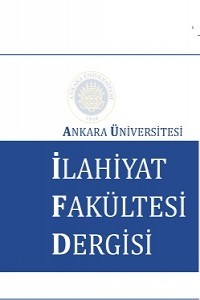Kant'ın Eleştirel Felsefe Öncesi Eserlerinde ve Eleştirel Felsefesinde Fiziko-Teolojik Delilin Kullanımı
Bu makalede Kant’ın eleştirel felsefe öncesinde savunmuş olduğu fiziko-teolojik delili, önce ontolojik imkan delilinin altına yerleştirdiği, sonra da eleştirel felsefe içerisinde transandantal felsefenin ilkeleri doğrultusunda kullanımını dönüştürerek muhafaza ettiği gösterilecektir. Kant önemini teslim ettiği fiziko-teolojik delili bütünüyle terk etmemiş onu hem tabiat araştırmaları için hem de ahlak deliline bir ön hazırlık olarak kritik felsefeye dahil etmiştir. Eleştirel felsefe öncesinde delilin geleneksel kullanımına eleştiriler yöneltmiş, onu Newton fiziğinin doğa görüşüne uygun olarak düzenlemiştir. Transandantal felsefeyle Tanrı’nın varlığının ispatlanamayacağına dair kesin hükmünü ilan ettikten sonra ise doğadaki amaçlılıktan hareketle Tanrı’nın var olduğunu düşünen aklın ulaşacağı sonuçların ahlak sahası açısından önemine işaret etmiştir. Aklın işleyiş prensipleri gereği ortaya çıkan böyle bir düşünme, ahlakın kullanımı altında faydalıdır. Çalışmada Kant’ın insanın düşünme ve yargılama faaliyetlerinin vazgeçilmez parçası olarak fiziko-teolojik delili kullanmaya devam ettiğine işaret edilecektir.
Anahtar Kelimeler:
Kant, Eleştirel Felsefe, Teistik Deliller, Fiziko-Teolojik Delil, Tasarım Delili, Ahlak Delili, Teleoloji, Yargı Yetisinin Eleştirisi
The Usage of the Physico-Theological Proof in Kant's Pre-Critical Writings and Critical Philosophy
In this article, it will be shown that Kant had first subsumed the physico-theological proof, which he defended before the critical philosophy under the ontological possibility argument, and then he preserved it within the critical philosophy by transforming its use according to the principles of transcendental philosophy. Kant did not abandon the physico-theological proof altogether; he acknowledged its importance and incorporated it into the critical philosophy for both its usage in natural inquiries and as a preliminary for moral proof. Before critical philosophy, he criticized its traditional employment and rearranged the proof in accordance with Newtonian physics. After announcing his final decision with transcendental philosophy that the existence of God cannot be proved, he pointed out the importance of the inferences of the reason regarding the existence of God for ethics. Such a way of thinking that occurs according to the principles of reason is useful under the governance of ethics. In this work, it will be indicated that Kant had continued to use physico-theological argument as an indispensable part of human thinking and judging.
Keywords:
Kant, Critical Philosophy, Theistic Proofs, Physico-Theological Proof, Design Argument, Moral Proof, Teleology, Critique of the Power of Judgment,
___
- Aydın, Mehmet Sait. Kant ve Çağdaş İngiliz Felsefesinde Tanrı-Ahlak İlişkisi. Ankara: Umran Yayınları, 1981.
- Çankı, Mustafa Namık. “Etre [Mevcûd],” Recep Alpyağıl (yay. haz.), Büyük Felsefe Lûgatı (İstanbul: İz Yayıncılık, 2021), c.1, ss.1428-1433.
- Descartes, René. “Les Méditations,” Ferdinand Alquié (ed.), Œuvres Philosophiques Tome II (Paris: Editions Garnier Frères, 1967) içinde, ss.377-505.
- Friedman, Michael. “Philosophy of Natural Science,” Paul Guyer (ed.), The Cambridge Companion to Kant and Modern Philosophy (New York: Cambridge University Press, 2006) içinde, ss.303-341.
- Kant, Immanuel. Akademieausgabe von Immanuel Kants Gesammelten Werken. https://korpora.zim.uni-duisburg-essen.de/kant/verzeichnisse-gesamt.html (08.08.2021)
- Kant, Immanuel. Arı Usun Eleştirisi. Terc. Aziz Yardımlı, İstanbul: İdea Yayınevi, 2019.
- Kant, Immanuel. Critique de la faculté de juger. Terc. Alain Renaut, Paris: Aubier, 1995.
- Kant, Immanuel. Critique of the Power of Judgment. Terc. Paul Guyer ve Eric Matthews. Cambridge: Cambridge University Press, 2002.
- Kant, Immanuel. Critique of Practical Reason. Mary J. Gregor (ed. ve terc.), Cambridge: Cambridge University Press, 1996.
- Kant, Immanuel. Critique of Pure Reason. Terc. Allen Wood ve Paul Guyer, Cambridge: Cambridge University Press, 1998.
- Kant, Immanuel. Evrensel Doğa Tarihi ve Gökler Kuramı. Terc. Seçkin Selvi, İstanbul: Morpa Kültür Yayınları, Mart 2004.
- Kant, Immanuel. “The Only Possible Argument,” David Walford (ed. ve terc.), Theoretical Philosophy, 1755-1770 (New York: Cambridge University Press, 1992) içinde, ss.107-201.
- Kant, Immanuel. Yargı Yetisinin Eleştirisi. Terc. Aziz Yardımlı, İstanbul: İdea Yayınevi, 2011.
- Keskin, Gamze. “Kant’ın Ontolojik Argüman Eleştirisinin Epistemolojik Temelleri,” FLSF Felsefe ve Sosyal Bilimler Dergisi 27 (2019), ss.97-116.
- Kraft, Michael. “Thinking the Physico-Teleological Proof,” International Journal for Philosophy of Religion. 12:2 (1981), ss.65-74.
- Logan, Ian. “What Happened to Kant’s Ontological Argument,” Philosophy and Phenomenological Research 74: 2 (2007), ss.346-363.
- Nuyen, A. T. “Kant on Miracles,” History of Philosophy Quarterly 19:3 (2002), ss.309-323.
- Pierris, Graciela de ve Michael Friedman. “Kant and Hume on Causality,” The Stanford Encyclopedia of Philosophy (Winter 2018 Edition), https://plato.stanford.edu/entries/kant-hume-causality/ (03.09.2021)
- Spinoza, Benedictus. Geometrik Düzene Göre Kanıtlanmış ve Beş Bölüme Ayrılmış Olan Etika. Terc. Hilmi Ziya Ülken, Ankara: Dost Kitabevi Yayınları, 2004.
- Watkins, Eric. “Universal natural history and theory of the heavens or essay on the constitution and the mechanical origin of the whole universe according to Newtonian principles: Editor’s Introduction,” Eric Watkins (ed.), Natural Science (Cambridge: Cambridge University Press, 2012) içinde, ss.182-187.
- Wood, Allen. Kant’s Rational Theology, Londra: Cornell University Press, 1978.
- ISSN: 1301-0522
- Yayın Aralığı: 2
- Başlangıç: 1952
- Yayıncı: ANKARA ÜNİVERSİTESİ > İLAHİYAT FAKÜLTESİ
